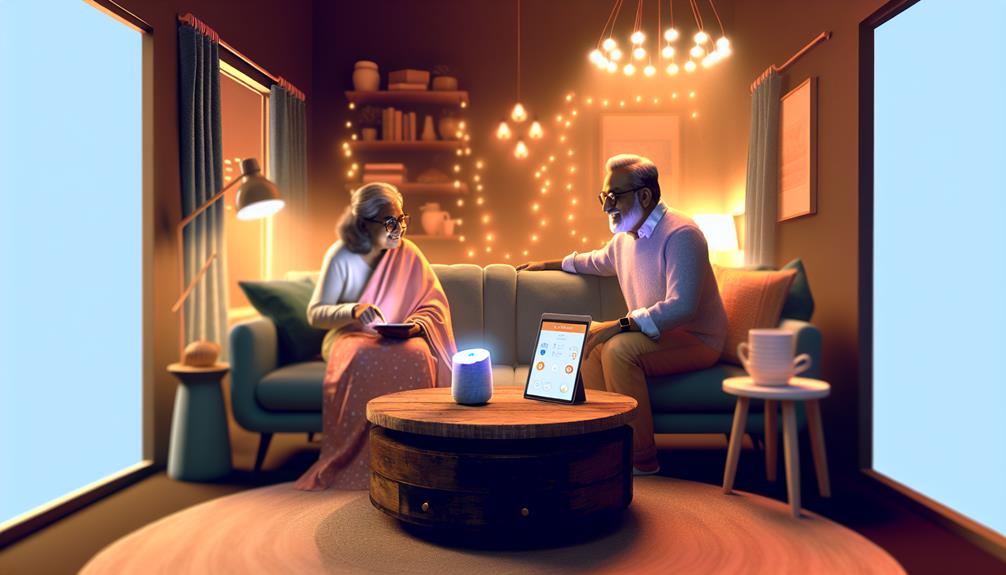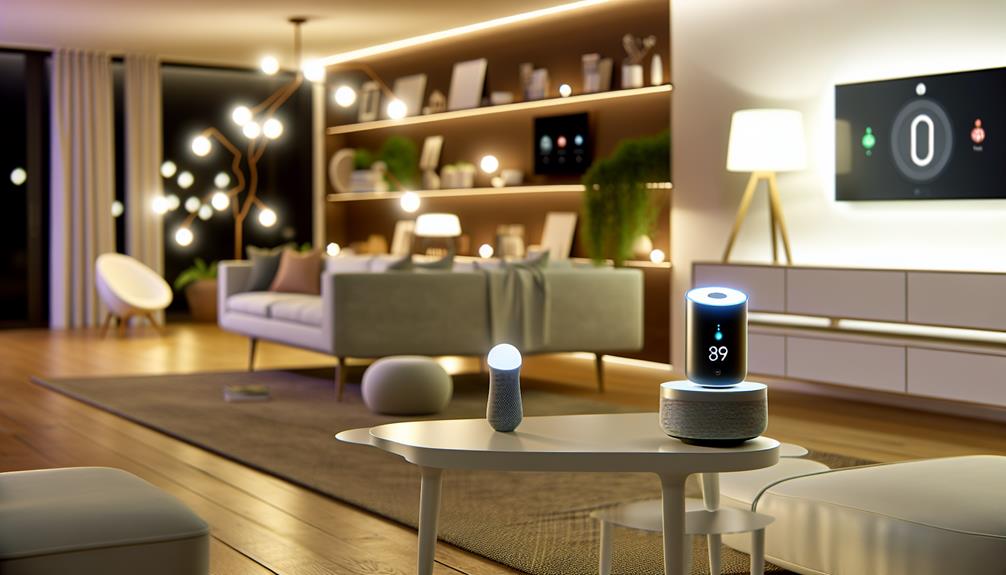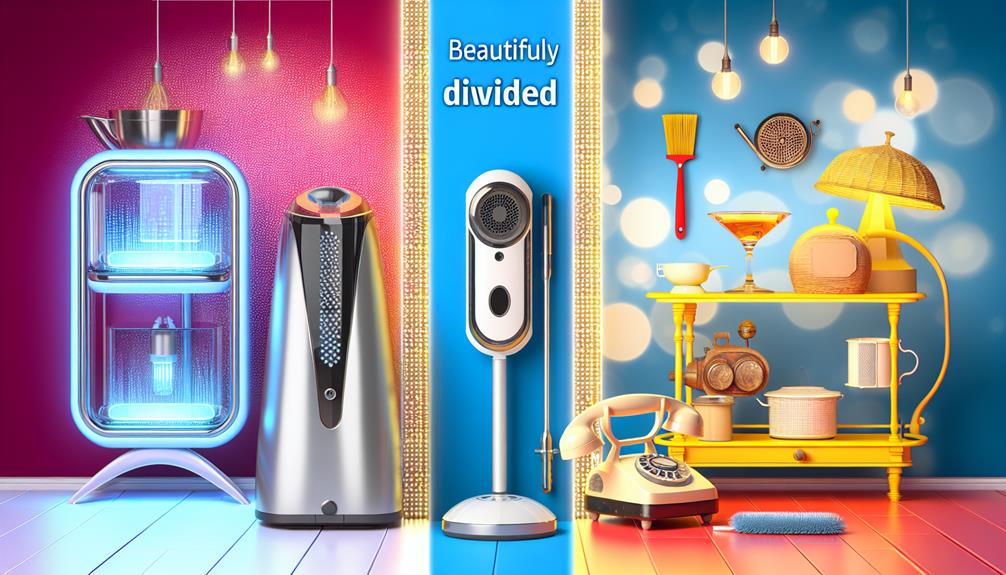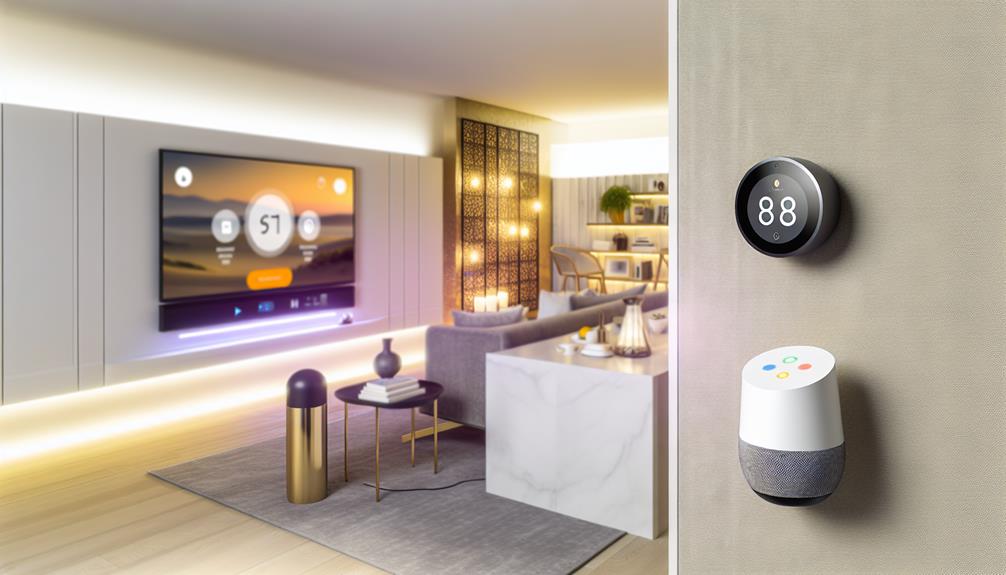Empowering Seniors With Innovative Smart Home Solutions
The integration of innovative smart home solutions presents a transformative opportunity to enhance the lives of seniors, particularly in fostering independence and safety. With advancements in technology, features such as voice-activated systems and remote health monitoring are becoming increasingly accessible. These tools not only facilitate daily living but also promote social connectivity, reducing feelings of isolation among older adults. However, as we explore the landscape of these smart technologies, it becomes essential to contemplate what specific solutions are most effective and how they can be tailored to meet the unique needs of this demographic.
Key takeaways
- Smart home technology enhances seniors' safety and independence by simplifying daily tasks and improving accessibility.
- Voice-activated assistants empower seniors to control their environment hands-free, fostering autonomy and reducing isolation.
- Remote health monitoring devices enable real-time tracking of vital signs, promoting proactive health management without frequent hospital visits.
- Automated daily routines assist seniors in managing medications and appointments, enhancing organization and reducing missed tasks.
- Integrated smart security systems provide peace of mind, allowing seniors to feel safe and supported in their own homes.
Importance of Smart Home Technology
In today's rapidly evolving technological landscape, many individuals may not fully realize the profound impact that smart home technology can have on the lives of seniors. This transformative technology offers a range of solutions designed to enhance safety, independence, and overall quality of life for older adults. By integrating smart devices into their homes, seniors can enjoy increased accessibility, allowing them to navigate daily tasks with greater ease.
However, it is essential to address affordability concerns that may hinder the adoption of these technologies. Many smart home solutions can be costly, making it challenging for seniors on fixed incomes to access these benefits. Fortunately, advancements in the market are leading to more affordable options without sacrificing functionality.
Moreover, user accessibility remains a critical focus in the development of smart home technology. Devices are increasingly designed with intuitive interfaces, ensuring that seniors can use them with minimal frustration.
Key Features of AI-Driven Devices
A multitude of key features characterize AI-driven devices, making them particularly beneficial for seniors seeking to enhance their daily living experiences. One of the most significant aspects is their advanced AI capabilities, which allow these devices to learn from user behavior, adapting to individual needs and preferences over time. This personalization can lead to increased comfort and convenience, ultimately fostering a sense of independence.
Moreover, device interoperability is essential in creating a seamless smart home environment. AI-driven devices can communicate with one another, enabling seniors to manage various aspects of their home through a single interface. For example, voice-activated assistants can control lighting, thermostat settings, and security systems, simplifying daily tasks and reducing the risk of accidents.
Additionally, these devices often include predictive analytics, alerting caregivers and family members to potential health issues or safety concerns. This proactive approach not only enhances the well-being of seniors but also promotes a feeling of connectedness with their loved ones.
Top Smart Home Solutions for Seniors
As seniors increasingly seek independence and safety in their homes, various smart home solutions are emerging to meet these needs.
Voice-activated assistants, smart security systems, and remote health monitoring devices offer practical support that enhances daily living while ensuring peace of mind for both seniors and their families.
Exploring these technologies can empower older adults to maintain their autonomy while benefiting from modern advancements in home safety and health management.
Voice-Activated Assistants
Voice-activated assistants have emerged as invaluable tools for seniors seeking to enhance their independence and safety at home. These digital companions, such as Amazon Alexa and Google Assistant, utilize voice commands to perform a variety of tasks, making daily life more manageable and enjoyable. By providing an intuitive interface, they allow seniors to control smart home devices, access information, and communicate with loved ones—all without needing to navigate complex technology.
One of the most notable advantages of voice-activated assistants is their accessibility options. Seniors with mobility challenges or visual impairments can benefit immensely from hands-free operation, allowing them to adjust lighting, play music, or set reminders simply by speaking. This ease of use fosters a sense of belonging, as seniors can remain connected to their communities and families with minimal effort.
Empirical research has shown that using voice technology can markedly improve the quality of life for older adults, promoting autonomy and reducing feelings of isolation. By integrating voice-activated assistants into their daily routines, seniors not only gain practical support but also experience a renewed sense of empowerment in their lives.
Smart Security Systems
Many seniors find comfort and peace of mind in the implementation of smart security systems, which can greatly enhance their safety at home. These systems often include smart surveillance cameras that allow seniors to monitor their surroundings in real-time, whether they are in the living room or away from home. The ability to see who is at the door or check on the property can provide a sense of control and security.
In addition to surveillance, many smart security systems offer emergency alerts that can notify family members or caregivers of unusual activity, ensuring that help is only a moment away. This feature fosters a strong sense of community and belonging, as seniors can feel connected to their loved ones, knowing that they are being looked after.
Moreover, these systems can be integrated with mobile devices, making it easy for seniors to receive notifications and alerts directly on their smartphones or tablets.
With user-friendly interfaces and customizable settings, smart security solutions cater to the unique needs of seniors, empowering them to live independently while feeling safe and supported in their own homes.
Remote Health Monitoring
Remote health monitoring has emerged as an essential solution for seniors seeking to maintain their health and independence while living at home. By utilizing innovative technology, seniors can now benefit from real-time health tracking and timely medical advice without the need for frequent hospital visits.
Wearable devices, such as smartwatches and health trackers, are at the forefront of this movement, allowing users to monitor crucial signs like heart rate, blood pressure, and activity levels effortlessly.
The integration of telehealth services into these systems further enhances their effectiveness. Seniors can connect with healthcare providers through virtual consultations, enabling them to receive personalized care and support tailored to their unique needs.
This seamless telehealth integration fosters a sense of belonging and reassurance, as seniors remain connected to their healthcare teams while enjoying the comforts of home.
Moreover, remote health monitoring not only empowers seniors to take charge of their health but also alleviates the concerns of family members. By ensuring that seniors can access medical assistance when needed, these smart home solutions create a safer, more supportive living environment, enhancing overall well-being and quality of life.
Enhancing Safety and Security
Guaranteeing the safety and security of seniors in their homes is a top priority, and innovative smart home solutions offer significant advancements in this area.
Technologies such as fall detection systems are essential in providing peace of mind for both seniors and their families. These systems utilize sensors and algorithms to monitor movement patterns, sending immediate notifications in the event of a fall. This guarantees timely intervention, which is critical for minimizing injury and facilitating a swift response.
Moreover, smart home solutions equipped with emergency alert systems empower seniors to reach help instantly. With a simple press of a button or voice command, they can alert caregivers or emergency services, fostering a sense of security and independence.
The integration of smart cameras and motion sensors further enhances home security by allowing seniors to monitor their surroundings in real time.
These features not only deter potential intruders but also create a safer living environment.
Improving Daily Living Assistance
Smart home technology has the potential to transform daily living for seniors, greatly enhancing their independence and quality of life.
By integrating innovative solutions into their homes, seniors can enjoy personalized care tailored to their individual needs, ultimately fostering a greater sense of belonging and community.
Here are three key ways smart home solutions improve daily living assistance:
1. Automated Daily Routines: Smart devices can help manage daily tasks, such as medication reminders and meal preparation, ensuring seniors stay on track with their schedules.
2. Remote Monitoring: Family members and caregivers can use smart home technology to monitor the well-being of seniors, providing peace of mind while allowing for independence.
This fosters connection and support from loved ones, even from a distance.
3. Voice-Activated Assistance: Voice-activated assistants can simplify interactions with technology, enabling seniors to easily control their environment—from adjusting lighting to playing music—thus enhancing their comfort and engagement in daily activities.
Future Trends in Smart Home Innovations
As technology continues to evolve, the potential for smart home solutions to further enhance the lives of seniors becomes increasingly promising. Future trends indicate a significant focus on social connectivity and energy efficiency, essential for fostering independence and community engagement among older adults.
Innovative smart home devices will not only help seniors manage daily tasks but also facilitate meaningful interactions with family and friends. Enhanced video calling systems, for instance, will provide seamless communication, reducing feelings of isolation.
| Trend | Impact on Seniors | Example |
|---|---|---|
| Advanced Voice Assistants | Increased accessibility and ease of use | Smart speakers with health reminders |
| Integrated Health Monitoring | Real-time health tracking and alerts | Wearable devices synced with home systems |
| Energy Management Systems | Reduced utility costs and environmental impact | Smart thermostats optimizing energy use |
These advancements will not only empower seniors to live more comfortably but also create a sense of belonging, as they remain connected to their loved ones and community. Embracing these innovations will ultimately lead to a healthier, more engaged lifestyle for seniors, enhancing their quality of life.
Frequently Asked Questions
How Can I Afford Smart Home Technology for Seniors?
Affording smart home technology for seniors can be achieved through effective budgeting strategies and exploring financial assistance programs. Research available grants and community resources to help minimize costs while enhancing the quality of life for loved ones.
Are There Specific Smart Home Products for Vision-Impaired Seniors?
Yes, specific smart home products exist for vision-impaired seniors, including assistive devices featuring voice recognition technology. These tools enhance independence, enabling seamless interaction with their environment while fostering a sense of belonging and security in their homes.
Can Smart Home Devices Be Installed Without Professional Help?
Smart home devices can often be installed through DIY installation, thanks to their user-friendly interfaces. This accessibility fosters independence, allowing individuals to create comfortable environments that cater to their unique needs and preferences, enhancing their sense of belonging.
What Privacy Concerns Exist With Smart Home Technology for Seniors?
In a world reminiscent of Orwell's "1984," seniors face privacy concerns with smart home technology, particularly regarding data security and user consent. Understanding these issues fosters a sense of community and empowers informed decisions for safer living environments.
How Do I Troubleshoot Common Issues With Smart Home Devices?
To troubleshoot common smart home device issues, guarantee proper device connectivity. Start with basic troubleshooting tips: restart the device, check Wi-Fi connections, and consult user manuals. These steps foster confidence and support in managing technology effectively.



